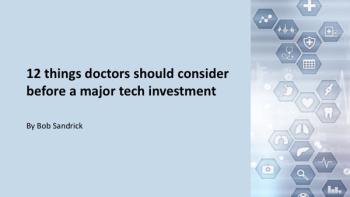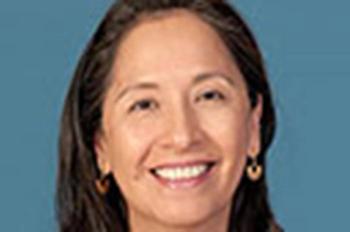
Is investing in cryptocurrency something to avoid or are physicians missing out on a prime investment opportunity if they don’t give it a try?

Is investing in cryptocurrency something to avoid or are physicians missing out on a prime investment opportunity if they don’t give it a try?

Not every practice has value, nor does every seller try to sell their practice properly.

As successful patient management expands to meet digital and lifestyle engagement needs and care continuity demands, technology should enable the transition without adding administrative burden.

When it comes to telemedicine services, the primary factor affecting reimbursements is legal policy.

Physicians can benefit from technology as much if not more than other professionals, but physicians can get overwhelmed trying to figure out what kind of technology is best for them.

Despite the benefits of telehealth to consumers, laws designed to protect state healthcare providers and patients often stand in the way.

Healthcare providers show strong interest in population health management but often struggle to assess the financial impact of the change from fee-for-service to the value-based reimbursement models that accompany it.

The conditions in which people live, learn, work, and play that can affect a wide range of health risks and outcomes.

On this Labor Day holiday, don’t forget about the hardworking physicians and nurses who provide quality care each and every day.

This face-to-face encounter enables physicians and other staff to get to know a candidate in ways that go beyond a resume on a desk and letters of recommendation.

What to consider before investing-and what it takes to win.

A runner-up of the 2018 Physician Writing Contest shares how she learned from a bad review.

Physicians are prime targets for scams, with large medical school debt and potential for high salaries

The proposed new rule would make it harder for accountable care organizations to realize the financial benefits of participating in the Medicare Shared Savings Program without also taking on more financial risk.

Because CMS can’t and Congress won’t get rid of hospital-based facility fees, doctors and patients must take action.

In the value-based payment era, the opportunity for greater financial rewards comes with greater risks.

Physicians share the benefits of having nurse practitioners available at their practices to aid both patients and fellow healthcare clinicians.

Two methods are better than one, but nothing is foolproof to stop eager hackers.

Making a cultural shift in terms of patient payments and bad debt isn’t easy, but it helps both those giving and receiving care.

Learn to delegate responsibly to help ease pressure on physicians.

In order to recruit and retain critical talent, it is essential your workplace shifts its culture to embrace lesbian, gay, bisexual, transgender, and questioning staff members.

Small practices score some wins, but work remains to be done under Medicare’s Quality Payment Program and Physician Fee Schedule.

While physicians may prefer to focus their attention on patient care, it’s imperative to carefully analyze expenses and calculate how every business decision can affect overall profitability.

Frequent use of social media is common, but it can cause some problems in a medical practice setting.

To payers, these visits tell a completely different story about the work that’s required to treat a patient.